We use cookies to ensure that we give you the best experience on our website. If you continue to use this site we will assume that you are happy with it
How To Run a Background Check in Texas Legally in 2023
 Written by Background Check Repair
Written by Background Check Repair
Background Checks | May 10, 2024
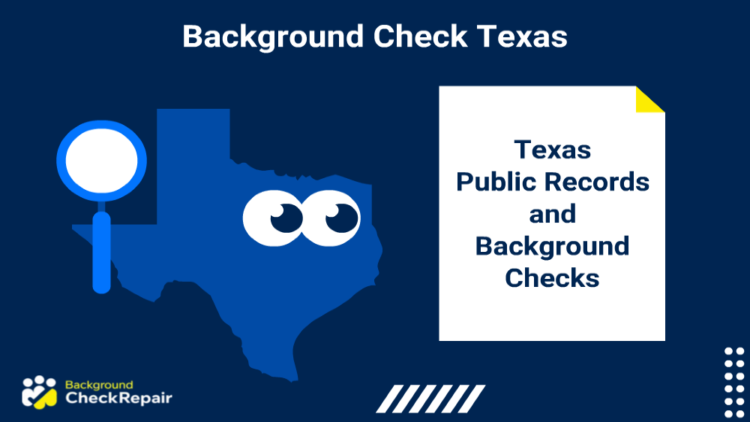
Table of Contents
Your company is growing, and you suddenly find yourself in need of new talent and need to run a background check Texas style.
You’ve found a wide selection of promising candidates and conducted all the initial interviews, so the next logical step is to do some research on them to make sure they’re safe hires that will provide stability and efficiency to your organization.
It all sounds pretty standard, but with new legislation being passed every day, it may be challenging to figure out how you can run a background check in Texas while remaining in compliance with the law.
While many U.S. states share common regulations and laws regarding applicant background checks, they also have individual requirements tailored specifically to meet their needs and those of their population. Texas background checks are no different.
If you’re in the process of hiring new personnel in Texas for your company or the company you work for, you must make sure to stick to those pertaining to your state (Texas), lest you open yourself up to expensive fines and legal repercussions.
Background Check: Texas State Rules
On the surface, running a background check in Texas seems to be a straightforward, run-of-the-mill procedure; however, the state has a set of very specific guidelines that you must follow to a tee to prevent breaking the law and to guarantee a dignifying, fair process for all the applicants interested in a job opening (a legal requirement of all employer background checks).
These rules are spelled out in Texas law under the Texas Business and Commerce Code in Section 20.05 regarding the reporting of prohibited information.2
These are designed to ensure that any interested party can undergo the candidacy process safe from any type of discrimination or otherwise stigmatizing conditions that could hinder their chances at being hired.
In Texas, background checks are overseen by the Texas Department of Public Safety (DPS). They manage the state’s database of convictions and provide records through a centralized database referred to as the Computerized Criminal History (CCH) program.
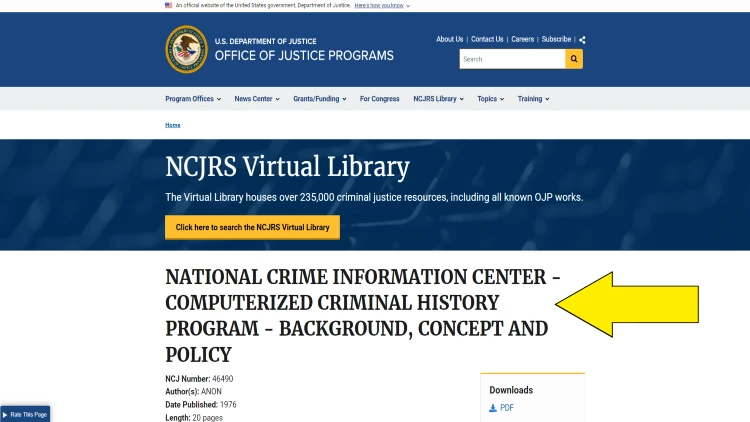
(Image: U.S. Department of Justice5)
However, this database has a catch: only registered law enforcement agencies can pull from its database.
Some rules to follow during the screening of an applicant are:
- You may not consider an applicant’s arrests, indictments, or convictions if these are over seven (7) years old unless the position they’re applying for pays $75k or more a year. If this condition is met, the research process may be conducted all the way back to age 18.
- If the job the candidates are applying for is related to insurance or delivery services (FedEx, UPS, AT&T, Verizon, etc.), there can be exceptions to the previous rule.
- Innocent until proven guilty: If a candidate was arrested, but the arrest did not result in a conviction, it must not be considered in making employment decisions.
- Dallas, and Travis County, as well as San Antonio, have “ban the box” initiatives for both county and city positions (more on this below).
- Companies with 15 or more employees are not allowed to include questions about criminal history in their job applications. Furthermore, a background search in Texas can only be conducted after there has been a conditional job offer. Failing to comply can result in a $500 fine.
Reasons for Running a Background Check in Texas
With all these conditions and rules to follow, properly running a background check in Texas can be intimidating and challenging, but it’s nothing compared to the possible consequences not performing one could entail for both you and your business. In reality, there are two main reasons why you’d want to background search your prospects: to protect your company and to protect your employees and customers.
Having an employee you can trust is priceless. Finding that ideal worker, who gets the job done and wears your company’s colors proudly, is a one in a one-in-a-million occurrence. Sadly, it’s much more common to have a negative workplace experience, and hiring the wrong person can cause a lot of problems, which can range from a lack of commitment and a loss of productive hours, to petty theft, and even, embezzlement. Performing a background check in Texas can help you lower the odds of stumbling upon a bad hire.
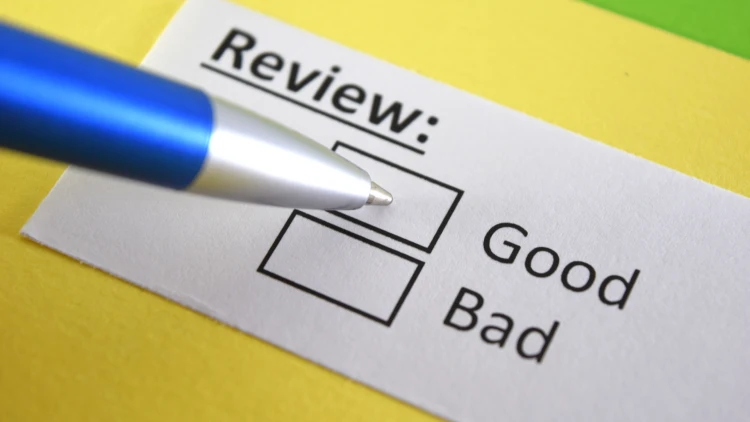 Moreover, while looking out for a company’s financial assets is extremely important, protecting your other employees and customers should also be a priority. Failing to adequately screen a candidate might result in catastrophic events that could make your company, or the company you work for, legally and financially liable for any damages your new staff member causes to others, be it out of negligence, or malice.
Moreover, while looking out for a company’s financial assets is extremely important, protecting your other employees and customers should also be a priority. Failing to adequately screen a candidate might result in catastrophic events that could make your company, or the company you work for, legally and financially liable for any damages your new staff member causes to others, be it out of negligence, or malice.
How To Get a Background Check (Texas) Legally
When looking to get a records check from the police or other government channels, a few simple steps are required.
- In compliance with the EEOC,3 avoid only running background checks on prospective employees of a certain race, sexual preference, sex, religion, or genetic history, as this is considered discrimination.
- Avoid asking about a candidate’s genetic history when the job they’re applying for does not involve operating heavy machinery or performing other day-to-day activities that might endanger them or others, should a medical condition related to this information interfere with them.
- Refrain from stating in the job application form that candidates’ information might be used to make hiring decisions. This disclaimer must be presented in a standalone format.
- Should an “investigative report” be conducted (a set of interviews with a candidate’s acquaintances or former employers to get information regarding their general character, reputation, and general traits), the applicant must be informed about the extension and focus of it.
- ALWAYS get an applicant’s written consent for performing a background check in Texas. Go into detail about what will be researched, and to what extent, to avoid misunderstandings. Simply put, if the background check is being used for professional purposes such as hiring, you must inform the candidate and get their written permission.
FCRA Compliance
FCRA compliance extends to all background checks Texas has to offer.
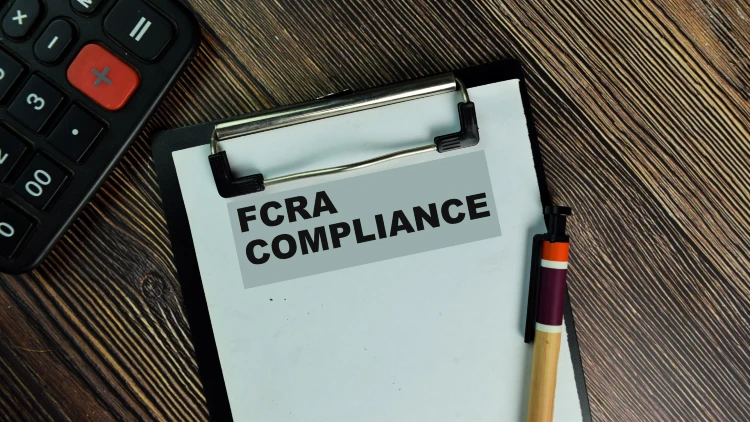 In adherence to the FCRA guidelines when running a background search in Texas on one of your prospective applicants, they have the right to:
In adherence to the FCRA guidelines when running a background search in Texas on one of your prospective applicants, they have the right to:
- Be informed that the background check will be conducted.
- Provide consent for the background check.
- Review their personal and financial information once it’s been obtained during this process.
- Correct any inaccurate pieces of information they find in their report.
- Appeal to the employer’s decision should they feel it was made unfairly or from a biased position.
If you wish to learn more about the FCRA, you can do so here.1
Free Background Check (Texas): Is It Possible?
There’s no denying that running a background check in Texas on every candidate that applies to a job opening can be costly and undesirable, especially, since only one of them will fill the position. In other words, it might feel like whatever expenses your company incurred to screen others not hired will have gone to waste.
Can there be a solution to this problem? Is it possible to run free background checks in Texas?
The short answer is, yes; however, due diligence is required when considering this option, since, as you probably guessed, these gratuitous service providers will only search through public records by using automated systems that will, more often than not, miss many possible hits on a prospective applicant.
In Texas, background checks that include only public records are easy to pull. The DPS and the Texas court system handle these records and you can even request a check by going through their approved processes.
However, these will not include anything outside of public records, such as those that are stored within the CCH.
These “free background checks” are often not FCRA compliant either, which can lead you in a world of hurt if it’s ever found out that you used it during a routine audit which is common during unemployment claims.
Therefore, it’s very important to afford the small fee when doing research on the candidates for a job opening. Consider how much time and effort it takes to train someone, and then consider how cheap a background check is compared to that. It just doesn’t make sense to cut corners.
Some additional reasons to avoid free background checks are:
- The information obtained is not vetted.
- No liability. Should a free background check provide mistaken or incomplete information, there are no grounds for you as a client to make them liable.
- Risk of noncompliance. These services, unlike paid options, are not likely to comply with FCRA, EEOC or Texas state guidelines when performing a background search.
- No human revisions. This will increase the risk of overlooking something important about your candidate’s background.
- Narrow spectrum of research. As stated above, these will only go through public records and a small handful of databases.
- Duplicate results. Multiple results may show for your candidate that are not even related; this is common because free background checks (Texas) just want to show as much information as possible on their website–even if it’s misleading.
How Much Does a Background Check in Texas Cost?
Now that you know free background checks are not the greatest option, you’ll be glad to learn that paid alternatives are not that expensive!
The Texas Department of Public Safety will charge you $15 per applicant for a fingerprint-based search on their databases. Moreover, if you’re looking for a deeper investigation (and you have a state request to conduct one), the FBI will also provide this service for around $13.25.
 There are also some private background check services that offer plans starting as low as $10 per process and can show even more information in different categories; however, it’s best to stick to those offered by government authorities first and use other providers as a complimentary check.
There are also some private background check services that offer plans starting as low as $10 per process and can show even more information in different categories; however, it’s best to stick to those offered by government authorities first and use other providers as a complimentary check.
Criminal Background Check: Texas Includes Only the Past 7 Years
In order to provide everyone with fair employment opportunities, when running a background check in Texas, employers may only consider arrests, criminal charges, or indictments that are less than seven years old when making hiring decisions regarding an applicant; however, there may be some exceptions.
If a position pays $75,000 or more per year, or if the job a candidate is applying for involves interaction with vulnerable groups such as children or elderly people, employers may consider any criminal offenses dating all the way back to the applicant’s 18th birthday to guarantee the safety of those under their care.
Lastly, it’s key to note that courts in Texas typically close off the records of those under the age of 18. Meaning, any criminal issues that may have occurred during minor years will not show up.
Keep in mind that an FBI background screen can include expunged or closed records, but will take longer than a standard level 2 Texas background check–even though both require fingerprints.
Background Check: Texas Doesn’t Include Arrests Without a Conviction
Innocent until proven guilty, right? When running a background check in Texas, one of the most important things to remember is that, as an employer, you may not take into consideration an applicant’s previous arrests or pleas of no contest if they did not result in a conviction. Using these to make a hiring decision goes against the state’s laws and regulations.
How Long Does a Texas Background Check Take?
A common question then arises: how much time is required for a background check in Texas?
A background check in Texas (or anywhere else in the U.S. for that matter), should take no more than 3-10 business days to complete and be handed over to you. A level 1 background check may even come back instantly or within 24 hours.
Normally, even if there are criminal record hits on a candidate’s report, this document should be issued within that timeframe; however, there may be cases in which this process could take a little longer.
If, for whatever reason, an applicant’s criminal history or any other aspects included in the report require further examination, there can be some delays. One example is using a third-party service that sends people in person to physical courts to inquire for the most up-to-date physical copies of a person’s background check.
Should a candidate’s background check involve the FBI, the results could take up to 30 business days to be released.
State of Texas Background Checks Do Not Restrict Ban the Box Laws
Some cities and counties like Austin, Dallas, DeSoto, Travis, and San Antonio have implemented ban the box laws that apply when running a background check in Texas.4 As you may know, the “ban the box” initiative is a campaign that started in 2003 and aims to give every citizen applying for a job a fair chance. Through this campaign, employers within the applicable area of jurisdiction are forbidden to ask about an applicant’s criminal background on their job application.
Does this mean you have to hire anyone without knowing their criminal background? Not quite. Ban the box laws in Texas require employers to extend a conditional job offer to an applicant before asking about their criminal history; the law hopes to allow them to have a chance to prove their worth instead of being automatically disqualified.
The key word here is “conditional.” Your job offer depends on the outcome of the background check you conduct on your applicant, should it be negative, you’re entitled to refuse employment under certain conditions.
Texas Firearm Background Check: Online Process
As opposed to many other states, you’re not required to pass a background check in Texas before purchasing a firearm. After a bill signed by Gov. Greg Abbott, Texans are allowed to carry holstered handguns with no special licenses or permits; however, this does not mean that there are no safety measures still implemented.
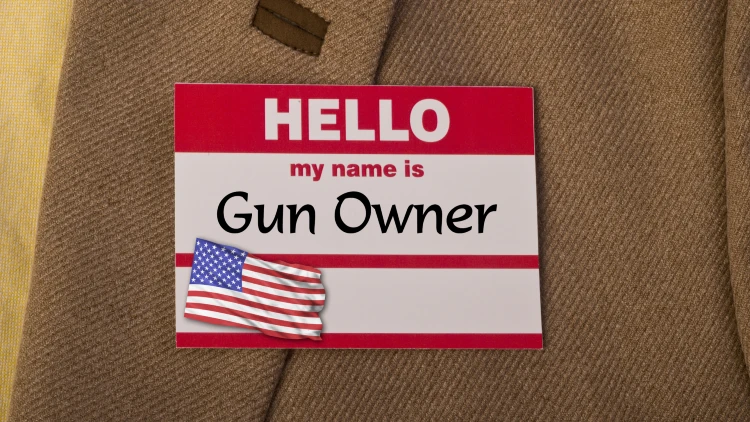 While you’re no longer obligated to be screened by a private gun vendor, establishments with a Federal Firearms License (FFL), are still required by the ATF to run a buyer’s information through the NICS (National Instant Criminal Background Check System) prior to selling them any kind of firearm.
While you’re no longer obligated to be screened by a private gun vendor, establishments with a Federal Firearms License (FFL), are still required by the ATF to run a buyer’s information through the NICS (National Instant Criminal Background Check System) prior to selling them any kind of firearm.
This process is quite simple and quick since you only need to fill out an ATF form with your information, hand it over to the store clerk, and have them run it through the system, which will return a result in less than 60 seconds. Licensed firearm vendors can execute this process either by phone or online.
Closing Reminders
Running background checks in Texas is essential to guarantee your company’s safety and longevity. Screening candidates can be daunting and complicated, especially considering the state’s ever-changing laws and regulations; nonetheless, the consequences of not performing one on your applicants are much greater than the inconvenience this process may cause.
Save yourself some trouble and take the time to research your candidates before making a hiring decision that could hinder your company. Make sure to stick to the FCRA, and EEOC background check guidelines throughout the entire screening process, and spare no expense on the services you choose. Remember, compliance is key for a background check (texas).
References
1Federal Trade Commission. (2024). Fair Credit Reporting Act. FTC.gov. Retrieved May 2, 2024, from <https://www.ftc.gov/legal-library/browse/statutes/fair-credit-reporting-act>
2FindLaw.com. (2021, April 14). Texas Business and Commerce Code – BUS & COM § 20.05. Reporting of Information Prohibited. FindLaw. Retrieved May 2, 2024, from <https://codes.findlaw.com/tx/business-and-commerce-code/bus-com-sect-20-05.html>
3U.S. Equal Employment Opportunity Commission. (2024). Background Checks: What Employers Need to Know. EOOC.gov. Retrieved May 2, 2024, from <https://www.eeoc.gov/laws/guidance/background-checks-what-employers-need-know>
4Wikipedia. (2024, January 3). Ban the Box. Wikipedia. Retrieved May 2, 2024, from <https://en.wikipedia.org/wiki/Ban_the_Box>
5U.S. Department of Justice. (2024). NATIONAL CRIME INFORMATION CENTER – COMPUTERIZED CRIMINAL HISTORY PROGRAM – BACKGROUND, CONCEPT AND POLICY. Office of Justice Programs. Retrieved May 11, 2024, from <https://www.ojp.gov/ncjrs/virtual-library/abstracts/national-crime-information-center-computerized-criminal-history-0>
